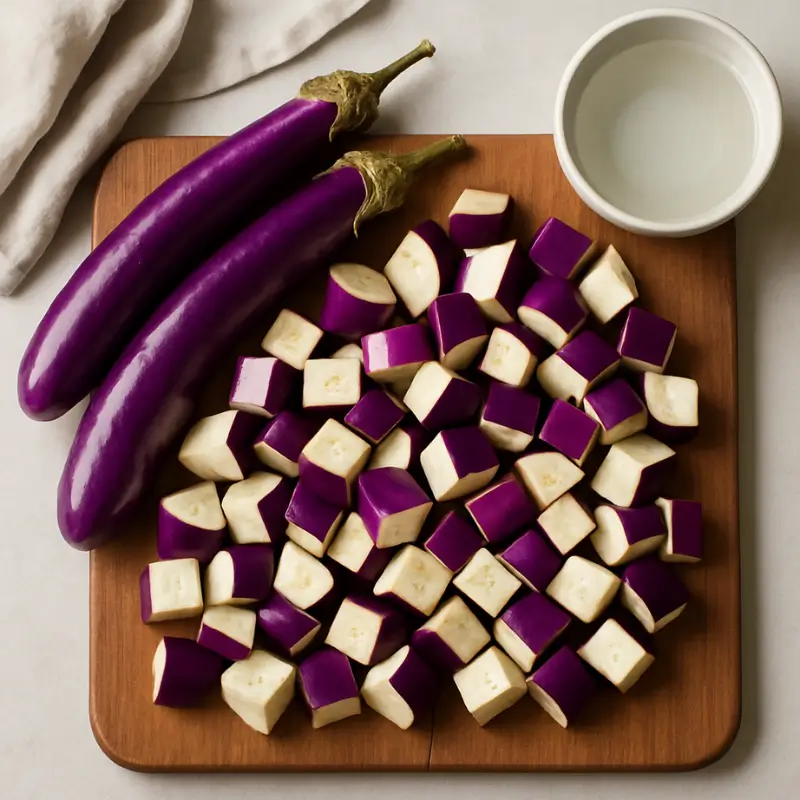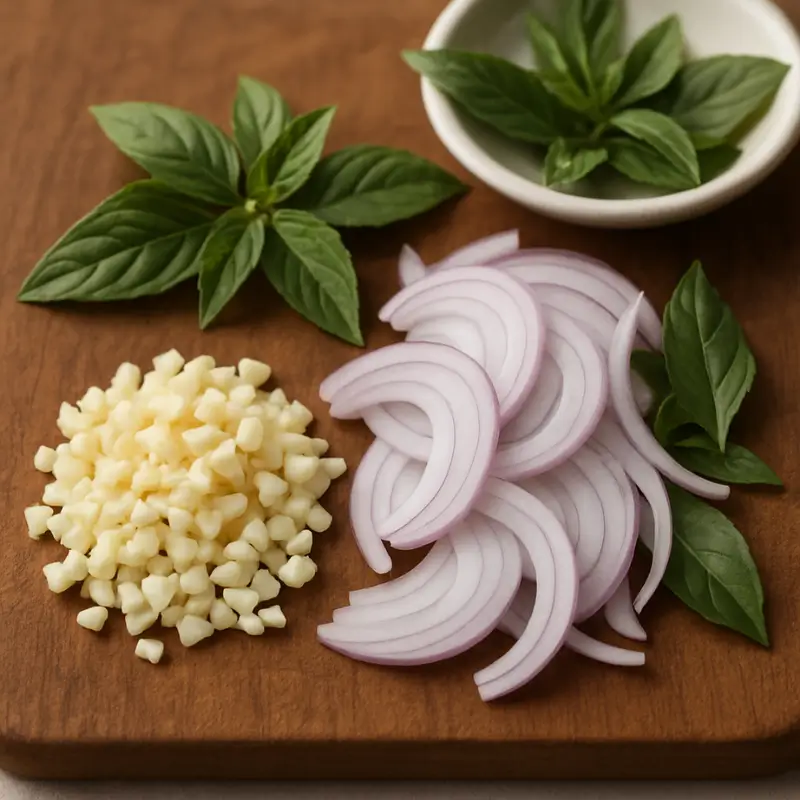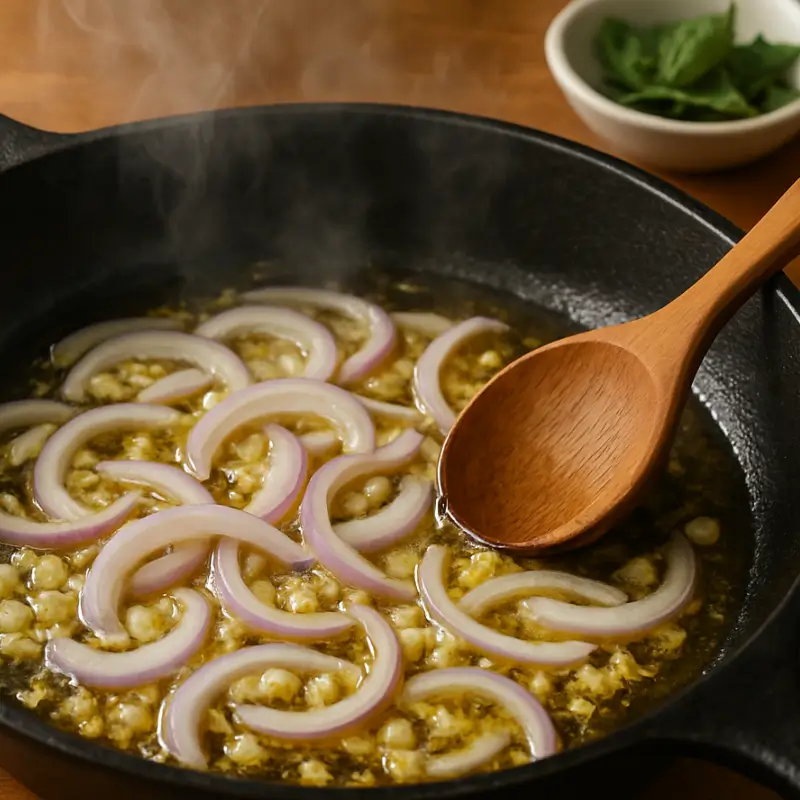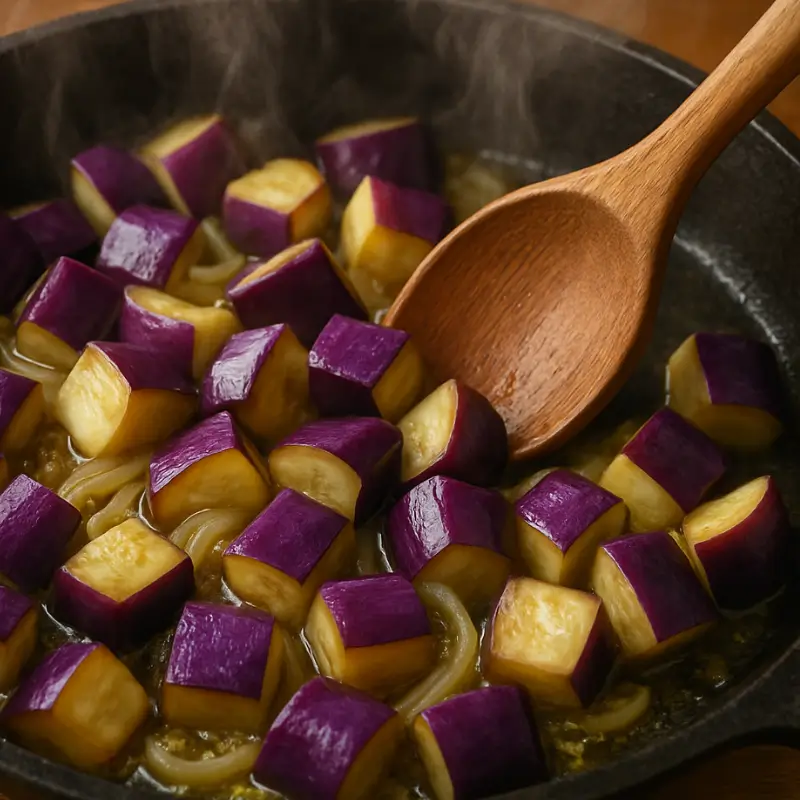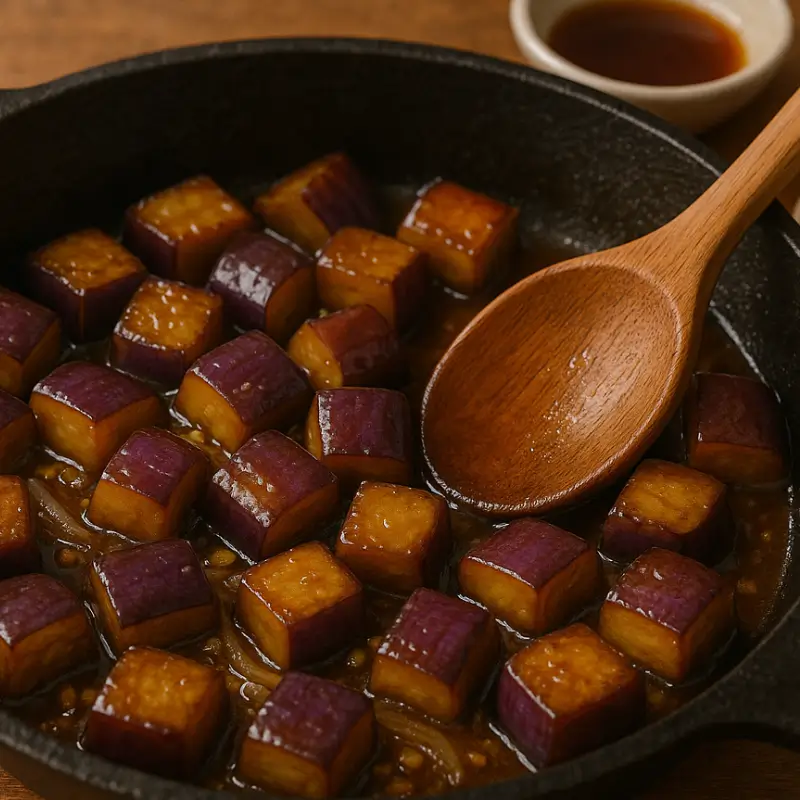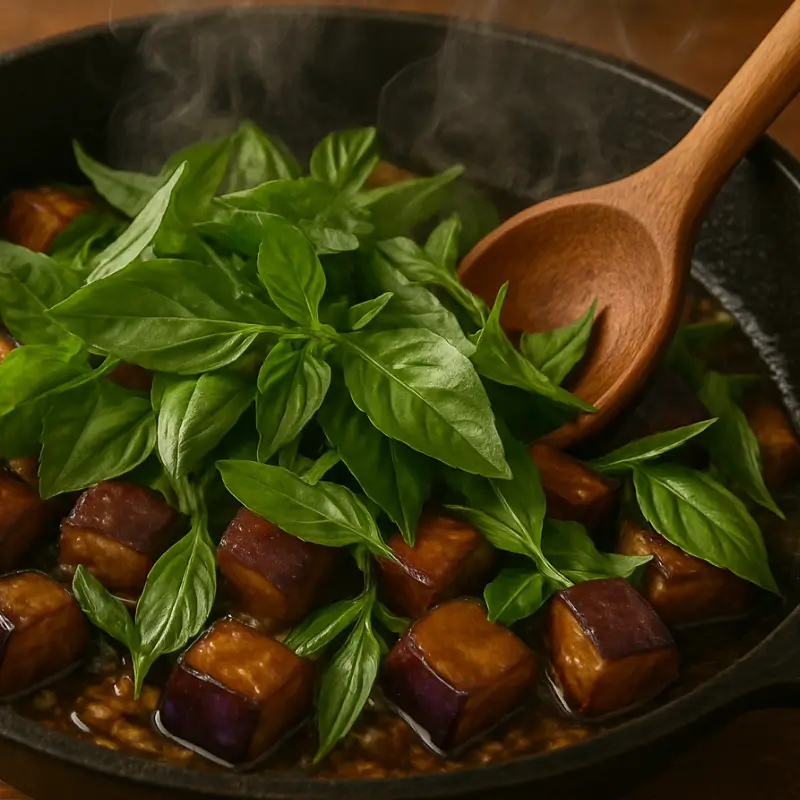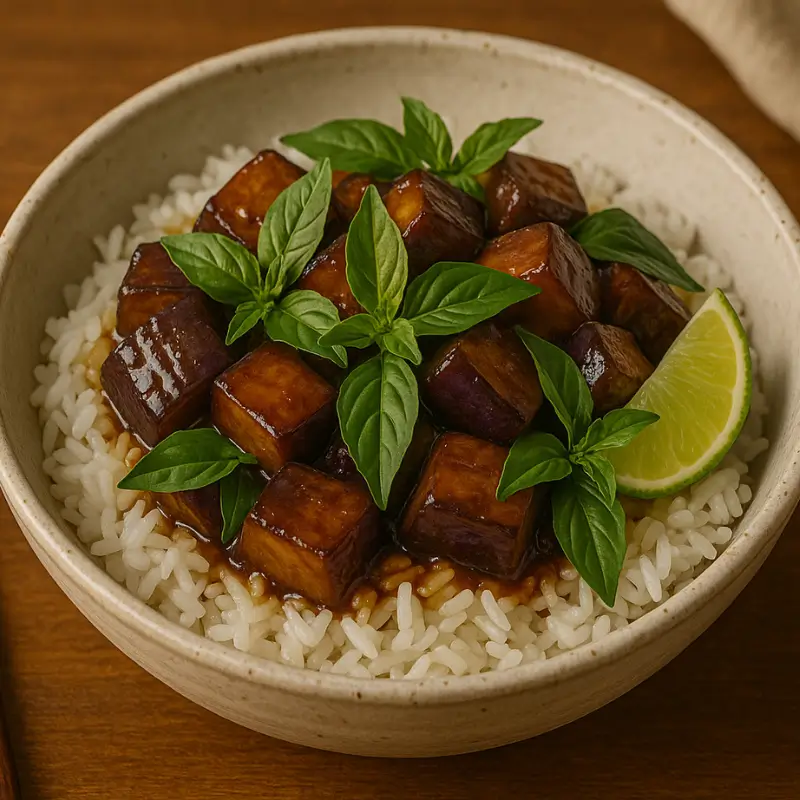Imagine a dish that effortlessly blends the vibrant flavors of Southeast Asia with the comforting simplicity of a weeknight meal. Thai Eggplant is a culinary treasure that transforms ordinary ingredients into a symphony of taste and texture, perfect for those hectic evenings when time is of the essence but flavor should never be compromised. With its luscious, tender eggplant pieces bathed in a fragrant, umami-rich sauce, this recipe is a delightful introduction to the world of Thai cuisine.
Table of Contents
The Allure of Thai Cuisine
Thai cuisine is renowned for its bold flavors, which artfully balance sweet, sour, salty, and spicy elements. It’s like a well-orchestrated symphony, where each note enhances the others, creating a harmonious dish that’s greater than the sum of its parts. This balance is rooted in the country’s rich cultural tapestry, influenced by neighboring regions and its own diverse geography, which provides a bounty of fresh ingredients. When you take a bite of Thai Eggplant, you’re not just tasting a dish; you’re experiencing a culinary tradition that’s been perfected over centuries.
A Glimpse into the Origins
Eggplant, or “makhuea,” as it’s known in Thailand, holds a special place in Thai cooking. This humble vegetable is celebrated for its ability to absorb flavors, acting as the perfect canvas for the bold spices and sauces typical of Thai dishes. Historically, eggplant has been a staple in Southeast Asian diets, with its cultivation dating back thousands of years. It’s believed that the plant was first domesticated in India, gradually spreading throughout Asia, where it was embraced for its versatility and nutritional benefits. In Thai cuisine, eggplants are often featured in curries, stir-fries, and salads, highlighting their adaptability.
The Unique Ingredients and Flavors
What sets Thai Eggplant apart is its use of distinct ingredients that create a unique flavor profile. At the heart of this dish is the Thai eggplant itself, smaller and rounder than the more common varieties found in Western markets. These eggplants are typically green or purple and have a slightly bitter taste that mellows out beautifully when cooked.
The magic of Thai Eggplant lies in the sauce—a concoction of soy sauce, fish sauce, and oyster sauce, each contributing its own layer of umami. The balance of these savory elements is complemented by the sweetness of palm sugar and the heat of fresh chilies, which can be adjusted to suit your spice tolerance. Aromatic ingredients like garlic, ginger, and Thai basil add depth and fragrance, turning a simple dish into a flavor-packed experience.
Cooking Techniques
While the ingredients are crucial, the cooking technique plays an equally important role. In this recipe, the eggplant is first sautéed to achieve a slightly charred exterior, which enhances its natural sweetness. This step also ensures that the eggplant remains tender yet firm, avoiding the mushy texture that can sometimes result from overcooking. The sauce is then added, allowing each piece of eggplant to soak up the flavors like a sponge, resulting in a dish that’s rich, savory, and utterly satisfying.
The Weeknight Wonder
What makes this recipe a weeknight hero is its simplicity and speed. With minimal prep and cook time, you can have a restaurant-quality dish on your table in under 30 minutes. It’s a versatile recipe, easily adapted to include additional proteins like chicken or tofu, or to accommodate dietary preferences. Whether you’re cooking for one or feeding a family, Thai Eggplant is a dish that pleases all palates, offering a quick escape to the exotic flavors of Thailand without leaving your kitchen.
Thai Eggplant Recipe: How to Perfect the Stir-Fry
Description
Enjoy the rich and savory taste of Thai eggplant stir-fry, a deliciously quick meal that promises a burst of flavor in every bite. Ideal for weeknight dinners.
Ingredients
Main Ingredients
Garnishes
Instructions
Gather Your Ingredients
-
Prep the Produce
Start by washing the Thai eggplants thoroughly. Slice them into bite-sized wedges, ensuring uniformity for even cooking.
Don't peel the eggplants; their skin adds a lovely texture and holds the pieces together. -
Get Your Aromatics Ready
Peel and finely chop a few cloves of garlic. Thinly slice a medium-sized onion and set aside with a handful of fresh basil leaves.Use Thai basil if you can find it—it adds an authentic flavor punch.
Cooking the Dish
-
Sauté the Aromatics
Heat a tablespoon of vegetable oil in a large pan over medium heat. Add the chopped garlic and sliced onion, sautéing until fragrant and slightly golden.The key here is not to rush—let the aromatics gently release their flavors. -
Add the Eggplants
Toss in the sliced eggplants. Stir frequently, allowing them to soak up the aromatic oil and begin to soften.Consider adding a pinch of salt at this stage to help draw out moisture from the eggplants. -
Season the Dish
Pour in a splash of soy sauce, a teaspoon of fish sauce, and a dash of sugar. Stir well to coat the eggplants in this savory-sweet sauce.Adjust the seasoning to taste, keeping in mind that fish sauce can be quite salty. -
Finish with Basil
Just before serving, toss in the fresh basil leaves, stirring until they wilt slightly and release their aroma.This last step is crucial for infusing the dish with that fresh, herbal finish.
Serving Suggestions
-
Plate and Enjoy
Serve your Thai eggplant dish hot, preferably over a bed of steamed jasmine rice.Garnish with extra basil leaves or a squeeze of lime for an added zing.
Nutrition Facts
Nutrition Facts
Servings 4
- Amount Per Serving
- Calories 188kcal
- % Daily Value *
- Total Fat 16.15g25%
- Saturated Fat 10.99g55%
- Trans Fat 0.02g
- Cholesterol 0.73mg1%
- Sodium 623.61mg26%
- Potassium 336.35mg10%
- Total Carbohydrate 11.73g4%
- Dietary Fiber 2.24g9%
- Sugars 4.38g
- Protein 2.93g6%
- Vitamin A 9.61 IU
- Vitamin C 9.87 mg
- Calcium 39.73 mg
- Iron 2.62 mg
- Vitamin E 1.09 IU
- Vitamin K 5.4 mcg
- Thiamin 0.05 mg
- Riboflavin 0.04 mg
- Niacin 1.06 mg
- Vitamin B6 0.14 mg
- Folate 25.75 mcg
- Vitamin B12 0.02 mcg
- Phosphorus 89.4 mg
- Magnesium 51.11 mg
- Zinc 0.59 mg
* Percent Daily Values are based on a 2,000 calorie diet. Your daily value may be higher or lower depending on your calorie needs.
Note
For a delightful twist, consider adding Thai basil leaves at the end, just before serving. They infuse the dish with an anise-like aroma and elevate its complexity. If you prefer a milder heat, carefully de-seed the Thai chilis before slicing.
To achieve the perfect texture, ensure your eggplants are cut uniformly—this promotes even cooking and prevents mushiness. When selecting eggplants, choose ones that are firm and glossy; they should feel heavy for their size.
For a velvety sauce, use full-fat coconut milk—it adds richness and depth that complement the eggplant beautifully. If you're short on lime leaves, a hint of lime zest can mimic the citrusy fragrance. Remember, a quick sauté in a hot pan ensures the eggplant absorbs flavors without becoming greasy.
Pair this dish with jasmine rice for an authentic experience. For those seeking a protein boost, toss in some tofu or cooked shrimp towards the end of cooking.
Adjust the fish sauce to your liking, keeping in mind that it adds umami and a salty kick. Enjoy the balance of sweet, spicy, and savory notes that make this a true Thai culinary experience.



